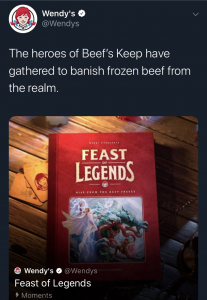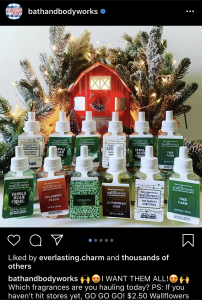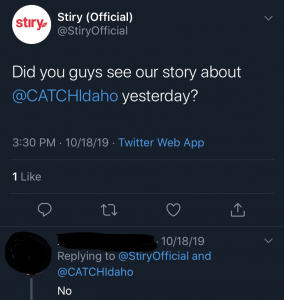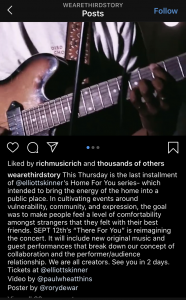The Disgusting Rhetoric Behind Social Media Copywriting
Let’s take a journey within the rhetoric behind social media and what it takes to grab your intended audience's attention.
Emme Chadwick
Okay, I’ll admit it, the title isn’t the best, but it got you to click and investigate. Congratulations, you just entered a crash course into the rhetoric behind social media marketing. Here we will observe the different forms of rhetoric used in everyday social media advertising. You’ll find that that these examples and the thought that goes behind advertising as a copywriter can be quite simple if you’ve got “the stuff.” Marketing as a copywriter is exciting but also challenging when trying to communicate your company’s overall mission and brand in a couple of words.
GROSS … RHETORIC AND SOCIAL MEDIA?
I know what you’re thinking: social media and rhetoric don’t go together. This is where you’d be wrong. Have you ever wondered what has drawn you to a specific Facebook ad or why you clicked on something that was sponsored on Instagram? Besides having the money to promote the company, that’s only the first step. If the company doesn’t immediately snatch their intended audience’s attention, it’s going to be a bumpy marketing campaign without much success.
The audience is the number one thing to keep in mind when producing any kind of writing, but especially in an online presence. So what makes a good ad? What can you do to grab the attention of those you are trying to reach? Most of all, how do your writing skills get nestled into copywriting for the digital world? Glad you asked; if you didn’t I’d be concerned that you are on the wrong page. Let’s get started and take a look at several examples of social media ads and what is particularly “good” or “bad” about them and how their use of rhetoric helped them.
YOU GUESSED IT! TWITTER AND INSTAGRAM
When it comes to the social media marketing world, Twitter and Instagram tend to be the things that most companies struggle with. Facebook and LinkedIn, on the other hand, are made for companies and Facebook’s ad platform makes it easier to reach your audience and allow you more room for a longer caption. When we observe Instagram and Twitter though, their platforms require a more tactful and, at times, difficult rhetorical approach.

The first example is from the social media platform, Twitter. Anyone who knows Twitter knows that you must keep your post to 280 characters or less. This is particularly challenging when it comes to advertising. You have to fit your information in a catchy, 280-character post. The adjacent image shows Twitter advertising done right. Wendy’s was brilliant in the way they took the popular game League of Legends and transformed it to fit their company needs by naming this campaign “Feast of Legends.” In doing this, they gave themselves what we call an asset.
Assets are videos, gifs, pictures, and basically, everything that can digitally go on the platform you’re posting on and tie into a specific campaign that you’re launching. By creating this for themselves, Wendy’s can now successfully run an eye-catching and engaging campaign that can carry on for weeks, months, or whatever they need to fit their timeline.
The next step that Wendy’s did for this campaign was their caption. If your asset is engaging that’s awesome! Who wants to read a boring caption? No one. The point of being a social media copywriter is being able to speak to your audience and essentially convince them that your company is the best thing that’s ever happened to them.
When Wendy’s captioned their post with “the heroes of Beef’s Keep have gathered to banish frozen beef from the realm,” your first thought is to either laugh or question what they mean, causing further investigation. They cleverly convey to their audience that their beef is never frozen, they play off of League of Legends, and they are adept at using all fresh ingredients with their products. Wendy’s accomplished their mission by only using 76 characters in their post.
When it comes to Twitter, the simpler, the better. No viewer or customer wants to read a lengthy Twitter post and have to follow an entire thread just to be told that the company’s ingredients are fresh. It seems like a lot, right? I promise, it’s not. When it comes to the different social media platforms, follow the phrase “read the room.” Are your competitors using lengthy language? Are they clever with their campaigns? What can you do to set yourself apart? When it comes to Twitter: simple, short, to the point, clever, and investigation worthy. Hook your audience from the start so that they feel like they have to investigate your company further. The more that you do this, the higher your follower count goes up and your company’s website gets a lot of traffic. Go you!

Okay, enough with Wendy’s crushing it on Twitter, and let’s move on to Bath and Body Works and the magic they create on their social media. Who doesn’t love Bath and Body Works? Great candles, body wash, soap, pretty much everything is amazing. They know it. They know their customers come to their location to smell good, get a gift or pick-me-up, and their social media presence reflects this greatly. It’s important to convey confidence in your writing about your company, whether you believe in the service or not. Let’s say and hope you do, for your sake.
By first looking at the asset in their post we can tell that it’s directed at the Christmas season, and our eyes look at the unique setup and colors that are in their posts. Then, finally, we see it … an engaging first line. No one wants to feel like they’re being sold something that no one else wants. In today’s world, it’s all about “keeping up with the Joneses,” even though we would like to believe that’s not the case. In the media communication world, this is called “fear of missing out.” An incredibly useful thing in advertising. Bath and Body Works immediately grabs the customer’s attention with their bright emojis and all caps.
Someone who is scrolling through their feed would stop and think, Is something on sale? What do they have that I want or need? Bath and Body Works tells the audience in the first line that it’s a product that they want, so you should want it too because they are in love with their product by using the line “Which fragrances are you hauling today? If you haven’t hit the stores yet, GO GO GO!” Much different from the examples we will take a look at down below. Grab your audience’s attention, keep it there, and don’t be afraid to use color!
THE BAD, THE HORRIBLE, THE UGLY

Okay so we saw Wendy’s and Bath and Body Works killing the social media game, but what about the companies that need to “beef up” their profile? Let’s take a look at the adjacent example. This company, Stiry, simply posted, “Did you guys see our story about @CATCHIdaho yesterday?” First off (this may sound harsh), but who cares? If you don’t give your audience a reason to care about your post, they won’t. Think of it this way: if you bought a dog who tore up all of your things, was aggressive, and had accidents in the house, it would be harder to love them. Don’t say it would be easy, because it wouldn’t. On the other hand, if you owned a loyal dog, who stayed by your side, allowed you to hold them, and played with you, it would be easier to love them. This is the same with social media, believe it or not. Boring captions and assets that aren’t engaging make it 10X harder to love a company as opposed to businesses that know what they’re doing.
This company has one like and one comment to their post. The commenter perfectly summed up why this is such a bad example, the simple commented, “No.” This viewer is thinking, Why would I see that? What’s it about? Where’s the link? How can I view it? And probably a lot more. It’s good to keep your audience guessing but only to an extent. Don’t completely leave them in the dark without any knowledge whatsoever. Give them a little something to get them on the hook and have them discover more.
No one that is in the scope of your intended audience is going to care unless you make them care. Please don’t kidnap people and force them to like your social media posts; instead take the simpler and legal route of drilling your company’s purpose and intended audience into your head. By starting with yourself first, you’ll know how to better reach your customers and would-be customers. Research your competitors on Twitter, look at what they’re doing. What works and what doesn’t? Take it, then improve it to make your post and the asset that can go along with it clever and engaging.

Take a look at the adjacent Instagram screenshot and think about it for a second. This was posted on a band’s Instagram page promoting their new song that just dropped. It gives us the album title, and what the song’s about, and even tags the singers. Great! Although it has the information we need, it has a lot of things in their post that we don’t need. There’s nothing eye-catching in the first line so why would the viewer stop their scrolling to read an entire paragraph with a million commas, no emojis, and not even an exclamation point? It looks dull right off the start, and their asset has a dark and unappealing color scheme. As I stated before, Twitter and Instagram should be punchy, upbeat, fun, and should also include the infamous emojis that we all know and love.
Emojis are something that can be seen as something bad, but when it comes down to it, they help grab attention in this modern-day age. Keeping up to date with today’s modern world will go a long way for you in the marketing world. Those that stop educating themselves on new platforms and techniques are going to die out quickly in the social media world. It’s just a fact! Brightening up your company’s feed makes it more attractive to customers who may click on your page. If a customer or potential record label company were to look at a dull-colored feed, paragraphs as captions, and overly long unnecessary explanations, they’d click out of it.
Get to the point! In today’s world nobody has time to read a lengthy caption, nor do they want to. I stopped reading after the second comma (then I had to actually read it for the purposes of this article); there was no point to be made for me so I quickly became uninterested as would many people if this popped up on their feed. Be bright, bubbly, and engaging while keeping the same professional tone that matches the company. You don’t want to be dropping in a heart-eyed emoji after every word for a funeral home. Read the room and take notes.
No one wants a lengthy post that has too much information. That’s for Facebook! Here’s something that won’t make sense: you want to be direct but indirect. Huh? I know, but let me explain, get the company’s point across immediately. Like Wendy’s stating that they never freeze their beef, then they leave the viewer hanging like Bath and Body Works not even mentioning their sale till the last line. Know the platform you’re working with inside and out. An engaged audience is an audience that will investigate and could become a potential client or customer.
ALL THE RHETORIC I KNOW YOU LOVE BEHIND SOCIAL MEDIA
You’re almost to the end, and to be frank, I’m surprised you’ve lasted this long (especially if it’s for an assignment or research), but I’ve tried my best to keep this interesting. Keep reading, because I’d like to think the information here is pure gold.
So you’re basically an expert now, right? You know all about rhetoric and you’re feeling like you’re up to the task of promoting a company. First off, no one really understands rhetoric (just kidding, please don’t yell at me)—you can always be learning new ways to market yourself and the company you work for.
If your company is just getting started, get with the big boss to see what they have envisioned for the company’s future and then come up with a branding goal that includes the tone of writing, colors, and look that your company wants to portray. The tone and language of writing will most likely be the two most important things that you can have in your rhetoric tool belt. Rhetoric in social media is the best way to ensure that a connection is made with your intended audience, along with a great asset to go along with the campaign. Play on people’s “fear of missing out,” and get into a rhythm of confidence in your company. Make your intended audience feel like they need your company in order to survive and thrive.
Being a social media copywriter is a challenging task at times, and perfecting being a good writer can help you hone in on that challenge. Rhetoric is essential in conveying your meaning as well as making you stand out as a copywriter. Writing is a competitive field, but a useful one to go into as companies will most likely always need someone that has strong rhetoric and writing skills.
Constantly improve on your writing and try to examine the good, the bad, and the ugly of other companies’ social media. Pull your audience in and make them feel like they are a part of your company’s community, but also be sure to know the purpose of your company. People want to feel included, and by tactfully using rhetoric you can accomplish the mission that you and your boss want.
Rhetoric is the way to go when it comes to being the best social media copywriter. Be confident in your rhetoric use and apply yourself. Looking at competitor’s social media isn’t cheating, it’s helping you elevate your platform to be better than theirs. Companies are looking for those that know all the ins and outs of social media as well as your use of rhetoric and your potential as a writer. Confidence in yourself and your company is key, fellow writers. So write on and get some money!

